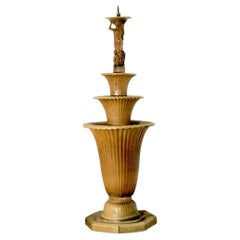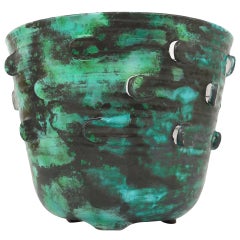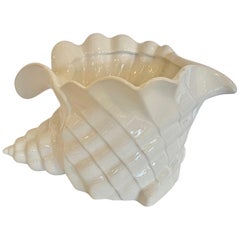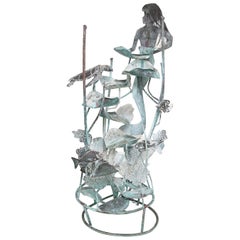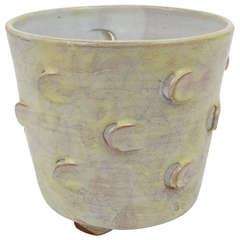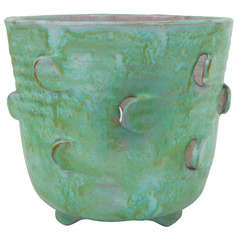Michael Powolny Building and Garden Elements
As both a designer and a teacher, the Austrian ceramicist and glassware designer Michael Powolny was an important figure in the development of modernist aesthetics in Vienna at the turn of the 20th century. His romantic sculptural pottery figures embrace the lush, dynamic stylings of Gustav Klimt and other progressive artists, while his functional pieces — such as glass bowls and vases — employ the simple linear and geometric ornamentation that marked the work of Josef Hoffmann and other members of the Wiener Werkstätte community of designers and craftsmen.
Powolny received classical training in ceramics from his father, a potter, and at the Vienna School of Applied Arts, but later joined in the modernizing movement in the Austrian arts at the close of the 19th century. In 1897, Klimt, Hoffman, Koloman Moser and other artists and architects founded the Vienna Secession, a group that fought for freedom of expression against the city’s tradition-bound arts establishment. Powolny’s work reflects the changing times. He used classical figures in his ceramics — female nudes, cherubs — yet would dress them in modern ornament such as garlands of abstract, geometric flowers. Pieces from Powolny’s ceramics company were sold through the Wiener Werkstätte (Viennese Workshops) founded by Hoffmann and Moser, and Hoffman later hired Powolny to create ceramic ornamentation for his architectural masterpiece, the Palais Stoclet in Brussels.
Powolny would go on to design glassware that combines elegant, tapering forms with precise linear decoration. His most influential work may have come as a professor at the School of Applied Arts, where he taught both Lucie Rie, the great Austrian-British modernist ceramicist, and the American potter Viktor Schreckengost, creator of the “Jazz Bowl,” an icon of the Streamline Moderne design. As you will see from the items on offer, Michael Powolny’s works have a double appeal: in their sprightly, endearing forms and as artifacts that document a period of signal change in the history of modern arts and crafts.
Early 20th Century Austrian Jugendstil Michael Powolny Building and Garden Elements
Ceramic, Stoneware
Early 20th Century Austrian Art Nouveau Michael Powolny Building and Garden Elements
Ceramic, Pottery
1960s Portuguese Vintage Michael Powolny Building and Garden Elements
Ceramic
1990s North American Michael Powolny Building and Garden Elements
Copper
1980s European Vintage Michael Powolny Building and Garden Elements
Ceramic
19th Century German Louis XV Antique Michael Powolny Building and Garden Elements
Ormolu
Early 20th Century French Art Deco Michael Powolny Building and Garden Elements
Iron
1970s American Mid-Century Modern Vintage Michael Powolny Building and Garden Elements
Copper
Early 20th Century French Art Nouveau Michael Powolny Building and Garden Elements
Bronze
Early 1900s Austrian Art Nouveau Antique Michael Powolny Building and Garden Elements
Pottery
Early 20th Century Austrian Art Nouveau Michael Powolny Building and Garden Elements
Metal
Mid-20th Century Unknown Art Nouveau Michael Powolny Building and Garden Elements
Wrought Iron
Early 1900s French Antique Michael Powolny Building and Garden Elements
Stone
1890s French Art Nouveau Antique Michael Powolny Building and Garden Elements
Ceramic
Early 20th Century Austrian Art Nouveau Michael Powolny Building and Garden Elements
Pottery
Early 20th Century Art Nouveau Michael Powolny Building and Garden Elements
Pottery
Early 20th Century Austrian Art Nouveau Michael Powolny Building and Garden Elements
Pottery
Early 20th Century Austrian Art Nouveau Michael Powolny Building and Garden Elements
Pottery
